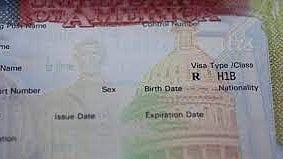Nation
Airfares surge as Indian professionals rush to beat US deadline after steep H-1B fee rise
Tech giants issue urgent travel advisories as Indian employees face risk of being stranded

Indian technology professionals on H-1B visas are scrambling to return to the United States before a sudden and unprecedented visa fee hike announced by US President Donald Trump takes effect on 21 September.
Under a presidential proclamation signed late on Friday, US employers will be required to pay USD 100,000 annually for every new H-1B visa petition from 12.01 am EDT (9.31 am IST) on Sunday.
Previously, the fee ranged between USD 2,000 and USD 5,000 depending on employer size and other criteria. Although existing visas are not immediately affected, anyone outside the US without the new fee attached to their petition risks being denied entry.
Flight frenzy and soaring airfares
The announcement triggered a rush among Indian H-1B workers currently visiting family or on business trips. Airlines reported a sharp surge in last-minute bookings to the US, pushing direct flight prices to record highs.
The airfare surge from India to the US following the H-1B visa fee hike has been dramatic and sudden. Within just a couple of hours after the announcement, one-way flights from New Delhi to New York's JFK airport jumped from around Rs 37,000 to Rs 70,000-80,000. By some media accounts, flights were costing as much as $4,500 (approximately Rs 4 lakh) one way.
The surge, according to posts on X, is driven by thousands of Indian tech workers rushing to return to the US before the September 21 deadline to avoid the unprecedented $100,000 fee per visa. Many travellers who had planned to remain in India for Durga Puja have been forced to cut short their stay, while others now face the prospect of missing the deadline altogether.
Entrepreneur Nayini Anurag Reddy described the mood on social media as “panic and heartbreak”, noting that thousands of H-1B and H-4 visa holders who came to India for weddings, stamping or family visits now risk losing years of effort and significant financial investment if they cannot re-enter the US before the cut-off.
Tech giants issue urgent advisories
Major technology firms have responded swiftly. Internal communications reviewed by Reuters show Microsoft, Amazon and JP Morgan advising employees on H-1B and H-4 visas to return to the US immediately and to avoid international travel “for the foreseeable future”.
Microsoft’s email reportedly warned staff to be back in the country before the deadline and urged dependents to remain in the US even though the proclamation does not specifically target H-4 visa holders.
The policy threatens to upend workforce planning for companies heavily reliant on H-1B talent. According to US Citizenship and Immigration Services (USCIS) data for 2025, Amazon employs more than 10,000 H-1B workers, followed by Tata Consultancy Services (5,505), Microsoft (5,189), Meta (5,123), Apple (4,202) and Google (4,181).
Published: undefined
Economic and legal implications
Immigration experts warn that the $100,000 annual surcharge will dramatically raise hiring costs and deter companies from sponsoring all but the highest-paid foreign workers.
Smaller Indian IT firms, which rely on onsite staff and operate on thinner margins, are expected to feel the greatest pressure, with some likely to shift more work offshore or reduce US operations.
David Bier, Director of Immigration Studies at the Cato Institute, criticised the move as discriminatory, noting that Indian professionals, who account for roughly 70 per cent of H-1B approvals are already faced with steep fees and long green-card waits. He described the proclamation as “official vilification of one of the most productive immigrant communities in US history”.
Indian government response
An Indian government official confirmed to the media that New Delhi is in touch with the Indian Embassy in Washington and industry body NASSCOM to assess the fallout.
“There will be an immediate impact on American technology firms that depend on Indian professionals,” the official said, while adding that some companies may respond by setting up or expanding global capability centres in India to counter US hiring constraints. Legal challenges in US courts are also expected.
A turning point for H-1B
The H-1B programme allows US companies to recruit foreign professionals for specialised roles where domestic talent is scarce. By imposing a six-figure annual levy on each new petition, the Trump administration has effectively recast the system into one that only the largest employers can afford.
Analysts say the change will likely reduce overall applications, restrict entry-level opportunities, and accelerate the shift towards local hiring and automation. For thousands of Indian tech workers racing to board flights this weekend, however, the immediate concern is far more urgent: reaching US soil before the doors close at midnight on 21 September.
Published: undefined
Follow us on: Facebook, Twitter, Google News, Instagram
Join our official telegram channel (@nationalherald) and stay updated with the latest headlines
Published: undefined